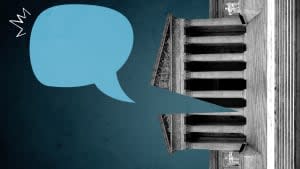The Supreme Court's unfashionable defense of free speech
- Oops!Something went wrong.Please try again later.

Americans aren't quite sure how much they like free speech. The cultural left thinks that various standards of harm should be used to limit its scope. The political right is quite eager to use state power to curtail academic freedom on race and related issues. These days the ACLU often places other considerations ahead of an absolute defense of the First Amendment. And polling shows widespread ambivalence about allowing free and open debate and discussion, with young people especially dubious about its worth.
But, as we learned Wednesday morning with the Supreme Court's decision in Mahanoy Area School District v B.L., the high court (minus one of its members) is strongly committed to the unfashionable position that the First Amendment's speech protections should be strongly defended.
With only conservative justice Clarence Thomas dissenting, the Supreme Court ruled in the case that high school student Brandi Levy's profanity-infused Snapchat posts objecting to her school's varsity cheerleading squad were constitutionally protected speech and therefore that the school should not have been allowed to punish her for them. A three-judge panel of the Third Circuit had sided with the plaintiff, though it was divided on the rationale, with two of the judges protecting the posts because they were composed and sent while the student was off campus, and the other judge ruling more narrowly that the posts were protected only because they did not disrupt school activities.
The court's majority decision by Stephen Breyer conceded something to both Third Circuit arguments while strongly supporting the student's free speech rights. And that is what places the Supreme Court so out of step with current trends. Thomas' dissent pointed out that schools "historically could discipline students in circumstances like those presented here," and he was right about that. This is something new. Or rather, it's just the latest sign that the Roberts court is firmly committed to an especially strong defense of free speech.
Fashionable or not, that's something that civil libertarians of all stripes should cheer.
You may also like
7 scathingly funny cartoons about Democrats' Joe Manchin problem
Bernie Sanders wants to know if cannabis reporter is 'stoned' right now
